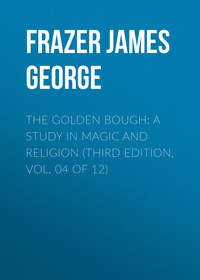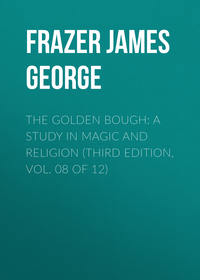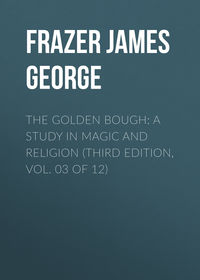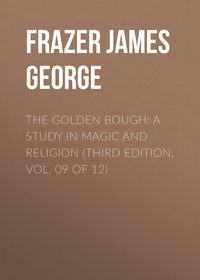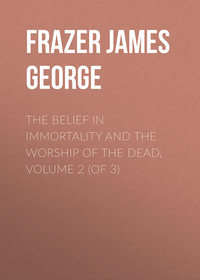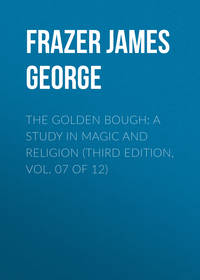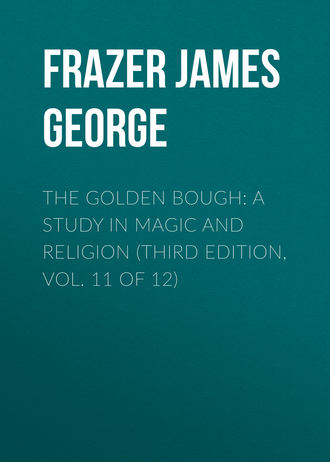 полная версия
полная версияThe Golden Bough: A Study in Magic and Religion (Third Edition, Vol. 11 of 12)
The external soul in a Lithuanian story. The Soulless King whose soul was in a duck's egg. The Soulless King. The water of life. The soul in the duck's egg.
A Lithuanian story relates how a prince married a princess and got with her a kingdom to boot. She gave him the keys of the castle and told him he might enter every chamber except one small room, of which the key had a bit of twine tied to it. But one day, having nothing to do, he amused himself by rummaging in all the rooms of the castle, and amongst the rest he went into the little forbidden chamber. In it he found twelve heads and a man hanging on the hook of the door. The man said to the prince, “Oblige me by fetching me a glass of beer.” The prince fetched it and the man drank it. Then the man said to the prince, “Oblige me by releasing me from the hook.” The prince released him. Now the man was a king without a soul, and he at once availed himself of his liberty to come to an understanding with the coachman of the castle, and between them they put the prince's wife in the coach and drove off with her. The prince rode after them and coming up with the coach called out, “Halt, Soulless King! Step out and fight!” The King stepped out and the fight began. In a trice the King had sliced the buttons off the prince's coat and pinked him in the side. Then he stepped into the coach and drove off. The prince rode after him again, and when he came up with the coach he called out, “Halt, Soulless King! Step out and fight!” The King stepped out and they fought again, and again the King sliced off the prince's buttons and pinked him in the side. Then, after carefully wiping and sheathing his sword, he said to his discomfited adversary, “Now look here. I let you off the first time for the sake of the glass of beer you gave me, and I let you off the second time because you let me down from that infernal hook; but if you fight me a third time, by Gad I'll make mince meat of you.” Then he stepped into the coach, told the coachman to drive on, jerked up the coach window with a bang, and drove away like anything. But the prince galloped after him and coming up with the coach for the third time he called out, “Halt, Soulless King! Step out and fight!” The King did step out, and at it the two of them went, tooth and nail. But the prince had no chance. Before he knew where he was, the King ran him through the body, whisked off his head, and left him lying a heap of raw mince beside the road. His wife, or rather his widow, said to the King, “Let me gather up the fragments that remain.” The King said, “Certainly.” So she made up the mince into a neat parcel, deposited it on the front seat of the coach, and away they drove to the King's castle. Well to cut a long story short, a brother-in-law of the deceased prince sent a hawk to fetch the water of life; the hawk brought it in his beak; the brother-in-law poured the water on the fragments of the prince, and the prince came to life again at once safe and sound. Then he went to the King's castle and played on a little pipe, and his wife heard it in the castle and said, “That is how my husband used to play, whom the King cut in bits.” So she went out to the gate and said to him, “Are you my husband?” “That I am,” said he, and he told her to find out from the King where he kept his soul and then to come and tell him. So she went to the King and said to him, “Where my husband's soul is, there must mine be too.” The King was touched by this artless expression of her love, and he replied, “My soul is in yonder lake. In that lake lies a stone; in that stone is a hare; in the hare is a duck, in the duck is an egg, and in the egg is my soul.” So the queen went and told her former husband, the prince, and gave him plenty of money and food for the journey, and off he set for the lake. But when he came to the lake, he did not know in which part of it the stone was; so he roamed about the banks, and he was hungry, for he had eaten up all the food. Then he met a dog, and the dog said to him, “Don't shoot me dead. I will be a mighty helper to you in your time of need.” So he let the dog live and went on his way. Next he saw a tree with two hawks on it, an old one and a young one, and he climbed up the tree to catch the young one. But the old hawk said to him, “Don't take my young one. He will be a mighty helper to you in your time of need.” So the prince climbed down the tree and went on his way. Then he saw a huge crab and wished to break off one of his claws for something to eat, but the crab said to him, “Don't break off my claw. It will be a mighty helper to you in your time of need.” So he left the crab alone and went on his way. And he came to people and got them to fish up the stone for him from the lake and to bring it to him on the bank. And there he broke the stone in two and out of the stone jumped a hare. But the dog seized the hare and tore him, and out of the hare flew a duck. The young hawk pounced on the duck and rent it, and out of the duck fell an egg, and the egg rolled into the lake. But the crab fetched the egg out of the lake and brought it to the prince. Then the King fell ill. So the prince went to the King and said, “You killed me. Now I will kill you.” “Don't,” said the King. “I will,” said the prince. With that he threw the egg on the ground, and the King fell out of the bed as dead as a stone. So the prince went home with his wife and very happy they were, you may take my word for it.359
The external soul in Teutonic stories. Transylvanian story of a witch whose life was in a light. German story of Soulless the cannibal, whose soul was in a box. The helpful animals.
Amongst peoples of the Teutonic stock stories of the external soul are not wanting. In a tale told by the Saxons of Transylvania it is said that a young man shot at a witch again and again. The bullets went clean through her but did her no harm, and she only laughed and mocked at him. “Silly earthworm,” she cried, “shoot as much as you like. It does me no harm. For know that my life resides not in me but far, far away. In a mountain is a pond, on the pond swims a duck, in the duck is an egg, in the egg burns a light, that light is my life. If you could put out that light, my life would be at an end. But that can never, never be.” However, the young man got hold of the egg, smashed it, and put out the light, and with it the witch's life went out also.360 In this last story, as in many other stories of the same type, the hero achieves his adventure by the help of certain grateful animals whom he had met and done a service to on his travels. The same incident occurs in another German tale of this class which runs thus. Once upon a time there was a young fellow called Body-without-Soul, or, for short, Soulless, and he was a cannibal who would eat nothing but young girls. Now it was a custom in that country that the girls drew lots every year, and the one on whom the lot fell was handed over to Soulless. In time it happened that the lot fell on the king's daughter. The king was exceedingly sorry, but what could he do? Law was law, and had to be obeyed. So they took the princess to the castle where Soulless resided; and he shut her up in the larder and fattened her for his dinner. But a brave soldier undertook to rescue her, and off he set for the cannibal's castle. Well, as he trudged along, what should he see but a fly, an eagle, a bear, and a lion sitting in a field by the side of the road, and quarrelling about their shares in a dead horse. So he divided the carcase fairly between them, and as a reward the fly and the eagle bestowed on him the power of changing himself at will into either of their shapes. That evening he made himself into an eagle, and flew up a high tree; there he looked about, but could see nothing but trees. Next morning he flew on till he came to a great castle, and at the gate was a big black board with these words chalked up on it: “Mr. Soulless lives here.” When the soldier read that he was glad, and changed himself into a fly, and flew buzzing from window to window, looking in at every one till he came to the one where the fair princess sat a prisoner. He introduced himself at once and said, “I am come to free you, but first you must learn where the soul of Soulless really is.” “I don't know,” replied the princess, “but I will ask.” So after much coaxing and entreaty she learned that the soul of Soulless was in a box, and that the box was on a rock in the middle of the Red Sea. When the soldier heard that, he turned himself into an eagle again, flew to the Red Sea, and came back with the soul of Soulless in the box. Arrived at the castle he knocked and banged at the door as if the house was on fire. Soulless did not know what was the matter, and he came down and opened the door himself. When he saw the soldier standing at it, I can assure you he was in a towering rage. “What do you mean,” he roared, “by knocking at my door like that? I'll gobble you up on the spot, skin and hair and all.” But the soldier laughed in his face. “You'd better not do that,” said he, “for here I've got your soul in the box.” When the cannibal heard that, all his courage went down into the calves of his legs, and he begged and entreated the soldier to give him his soul. But the soldier would not hear of it; he opened the box, took out the soul, and flung it over his head; and that same instant down fell the cannibal, dead as a door-nail.361
German story of flowers that were life-tokens.
Another German story, which embodies the notion of the external soul in a somewhat different form, tells how once upon a time a certain king had three sons and a daughter, and for each of the king's four children there grew a flower in the king's garden, which was a life-flower; for it bloomed and flourished so long as the child lived, but drooped and withered away when the child died. Now the time came when the king's daughter married a rich man and went to live with him far away. But it was not long before her flower withered in the king's garden. So the eldest brother went forth to visit his brother-in-law and comfort him in his bereavement. But when he came to his brother-in-law's castle he saw the corpse of his murdered sister weltering on the ramparts. And his wicked brother-in-law set before him boiled human hands and feet for his dinner. And when the king's son refused to eat of them, his brother-in-law led him through many chambers to a murder-hole, where were all sorts of implements of murder, but especially a gallows, a wheel, and a pot of blood. Here he said to the prince, “You must die, but you may choose your kind of death.” The prince chose to die on the gallows; and die he did even as he had said. So the eldest son's flower withered in the king's garden, and the second son went forth to learn the fate of his brother and sister. But it fared with him no better than with his elder brother, for he too died on the gallows in the murder-hole of his wicked brother-in-law's castle, and his flower also withered away in the king's garden at home. Now when the youngest son was also come to his brother-in-law's castle and saw the corpse of his murdered sister weltering on the ramparts, and the bodies of his two murdered brothers dangling from the gallows in the murder-hole, he said that for his part he had a fancy to die by the wheel, but he was not quite sure how the thing was done, and would his brother-in-law kindly shew him? “Oh, it's quite easy,” said his brother-in-law, “you just put your head in, so,” and with that he popped his head through the middle of the wheel. “Just so,” said the king's youngest son, and he gave the wheel a twirl, and as it spun round and round, the wicked brother-in-law died a painful death, which he richly deserved. And when he was quite dead, the murdered brothers and sister came to life again, and their withered flowers bloomed afresh in the king's garden.362
The warlock in the wood, whose heart was in a bird.
In another German story an old warlock lives with a damsel all alone in the midst of a vast and gloomy wood. She fears that being old he may die and leave her alone in the forest. But he reassures her. “Dear child,” he said, “I cannot die, and I have no heart in my breast.” But she importuned him to tell her where his heart was. So he said, “Far, far from here in an unknown and lonesome land stands a great church. The church is well secured with iron doors, and round about it flows a broad deep moat. In the church flies a bird and in the bird is my heart. So long as the bird lives, I live. It cannot die of itself, and no one can catch it; therefore I cannot die, and you need have no anxiety.” However the young man, whose bride the damsel was to have been before the warlock spirited her away, contrived to reach the church and catch the bird. He brought it to the damsel, who stowed him and it away under the warlock's bed. Soon the old warlock came home. He was ailing, and said so. The girl wept and said, “Alas, daddy is dying; he has a heart in his breast after all.” “Child,” replied the warlock, “hold your tongue. I can't die. It will soon pass over.” At that the young man under the bed gave the bird a gentle squeeze; and as he did so, the old warlock felt very unwell and sat down. Then the young man gripped the bird tighter, and the warlock fell senseless from his chair. “Now squeeze him dead,” cried the damsel. Her lover obeyed, and when the bird was dead, the old warlock also lay dead on the floor.363
The external soul in Norse stories. The giant whose heart was in a duck's egg.
In the Norse tale of “the giant who had no heart in his body,” the giant tells the captive princess, “Far, far away in a lake lies an island, on that island stands a church, in that church is a well, in that well swims a duck, in that duck there is an egg, and in that egg there lies my heart.” The hero of the tale, with the help of some animals to whom he had been kind, obtains the egg and squeezes it, at which the giant screams piteously and begs for his life. But the hero breaks the egg in pieces and the giant at once bursts.364 In another Norse story a hill-ogre tells the captive princess that she will never be able to return home unless she finds the grain of sand which lies under the ninth tongue of the ninth head of a certain dragon; but if that grain of sand were to come over the rock in which the ogres live, they would all burst “and the rock itself would become a gilded palace, and the lake green meadows.” The hero finds the grain of sand and takes it to the top of the high rock in which the ogres live. So all the ogres burst and the rest falls out as one of the ogres had foretold.365
The external soul in Danish stories. The warlock whose heart was in a duck's egg. The helpful animals.
In a Danish tale a warlock carries off a princess to his wondrous subterranean palace; and when she anxiously enquires how long he is likely to live, he assures her that he will certainly survive her. “No man,” he says, “can rob me of my life, for it is in my heart, and my heart is not here; it is in safer keeping.” She urges him to tell her where it is, so he says: “Very far from here, in a land that is called Poland, there is a great lake, and in the lake is a dragon, and in the dragon is a hare, and in the hare is a duck, and in the duck is an egg, and in the egg is my heart. It is in good keeping, you may trust me. Nobody is likely to stumble upon it.” However, the hero of the tale, who is also the husband of the kidnapped princess, has fortunately received the power of turning himself at will into a bear, a dog, an ant, or a falcon as a reward for having divided the carcase of a deer impartially between four animals of these species; and availing himself of this useful art he not only makes his way into the warlock's enchanted palace but also secures the egg on which the enchanter's life depends. No sooner has he smashed the egg on the enchanter's ugly face than that miscreant drops down as dead as a herring.366
Danish story of the magician whose heart was in a fish. The magician's heart.
Another Danish story tells how a lad went out into the world to look for service. He met a man, who hired him for three years and said he would give him a bushel of money for the first year, two bushels of money for the second, and three bushels of money for the third. The lad was well content, as you may believe, to get such good wages. But the man was a magician, and it was not long before he turned the lad into a hare, by pronouncing over him some strange words. For a whole year the lad scoured the woods in the shape of a hare, and there was not a sportsman in all the country round about that had not a shot at him. But not one of them could hit him. At the end of the year the magician spoke some other words over him and turned him back into human form and gave him the bushel of money. But then the magician mumbled some other words, and the lad was turned into a raven and flew up into the sky. Again all the marksmen of the neighbourhood pointed their guns at him and banged away; but they only wasted powder and shot, for not one of them could hit him. At the end of the year the magician changed him back into a man and gave him two bushelfuls of money. But soon after he changed him into a fish, and in the form of a fish the young man jumped into the brook and swam down into the sea. There at the bottom of the ocean he saw a most beautiful castle all of glass and in it a lovely girl all alone. Round and round the castle he swam, looking into all the rooms and admiring everything. At last he remembered the words the magician had spoken when he turned him back into a man, and by repeating them he was at once transformed into a stripling again. He walked into the glass castle and introduced himself to the girl, and though at first she was nearly frightened to death, she was soon very glad to have him with her. From her he learned that she was no other than the daughter of the magician, who kept her there for safety at the bottom of the sea. The two now laid their heads together, and she told him what to do. There was a certain king who owed her father money and had not the wherewithal to pay; and if he did not pay by such and such a day, his head was to be cut off. So the young man was to take service with the king, offer him the bushels of money which he had earned in the service of the magician, and go with him to the magician to pay his debt. But he was to dress up as the court Fool so that the magician would not know him, and in that character he was to indulge in horse-play, smashing windows and so on, till the magician would fall into such a rage that though the king had paid his debt to the last farthing he would nevertheless be condemned to instant execution unless he could answer the magician's questions. The questions would be these, “Where is my daughter?” “Would you know her if you saw her?” Now the magician would cause a whole line of phantom women to pass by, so that the young man would not be able to tell which of them was the sorcerer's daughter; but when her turn came to pass by she would give him a nudge as a sign, and so he would know her. Then the magician would ask, “And where is my heart?” And the young man was to say, “In a fish.” And the magician would ask, “Would you know the fish if you saw it?” And he would cause all sorts of fishes to pass by, and the young man would have to say in which of them was the heart of the magician. He would never be able of himself to tell in which of them it was, but the girl would stand beside him, and when the right fish passed by, she would nudge him and he was to catch it and rip it up, and the magician would ask him no more questions. Everything turned out exactly as she had said. The king paid his debt to the last farthing; but the young man disguised as the court Fool cut such capers and smashed so many glass windows and doors that the heaps of broken glass were something frightful to contemplate. So there was nothing for it but that the king, who was of course responsible for the pranks of his Fool, should either answer the magician's questions or die the death. While they were getting the axe and the block ready in the courtyard, the trembling king was interrogated by the stern magician. “Where is my daughter?” asked the sorcerer. Here the court Fool cut in and said, “She is at the bottom of the sea.” “Would you know her if you saw her?” enquired the magician. “To be sure I would,” answered the Fool. So the magician caused a whole regiment of girls to defile before him, one after the other; but they were mere phantoms and apparitions. Almost the last of all came the magician's daughter, and when she passed the young man she pinched his arm so hard that he almost shrieked with pain. However, he dissembled his agony and putting his arm round her waist held her fast. The magician now played his last trump. “Where is my heart?” said he. “In a fish,” said the Fool. “Would you know the fish if you saw it?” asked the magician. “To be sure I would,” answered the Fool. Then all the fishes of the sea swam past, and when the right one came last of all, the girl nudged her lover; he seized the fish, and with one stroke of his knife slit it from end to end. Out tumbled the magician's heart; the young man seized it and cut it in two, and at the same moment the magician fell dead.367
The external soul in Icelandic stories. The king's son in the cave of the giantesses whose life was in an egg. The swans' song. The life-egg. An Icelandic parallel to Meleager.
In Iceland they say that once a king's son was out hunting in a wood with the courtiers, when the mist came down so thick that his companions lost sight of the prince, and though they searched the woods till evening they could not find him. At the news the king was inconsolable, and taking to his bed caused proclamation to be made that he who could find and bring back his lost son should have half the kingdom. Now an old man and his old wife lived together in a wretched hut, and they had a daughter. She resolved to seek the lost prince and get the promised reward. So her parents gave her food for the journey and a pair of new shoes, and off she set. Well, she walked and better walked for days, and at last she came towards evening to a cave and going into it she saw two beds. One of them was covered with a cloth of silver and the other with a cloth of gold; and in the bed with the golden coverlet was the king's son fast asleep. She tried to wake him, but all in vain. Then she noticed some runes carved on the bedsteads, but she could not read them. So she went back to the mouth of the cave and hid behind the door. Hardly had she time to conceal herself when she heard a loud noise and saw two giantesses, two great hulking louts they were, stride into the cave. No sooner were they in than one said to the other, “Ugh, what a smell of human flesh in our cave!” But the other thought the smell might come from the king's son. They went up to the bed where he was sleeping, and calling two swans, which the girl had not perceived in the dim light of the cave, they said: —
“Sing, sing, my swans,That the king's son may wake.”So the swans sang and the king's son awoke. The younger of the two hags offered him food, but he refused it; then she asked him, if he would marry her, but he said “No, certainly not.” Then she shrieked and said to the swans: —
“Sing, sing, my swans,That the king's son may sleep.”The swans sang and the king's son fell fast asleep. Then the two giantesses lay down in the bed with the silver coverlet and slept till break of day. When they woke in the morning, they wakened the prince and offered him food again, but he again refused it; and the younger hag again asked him if he would have her to wife, but he would not hear of it. So they put him to sleep again to the singing of the swans and left the cave. When they were gone a while, the girl came forth from her hiding-place and waked the king's son to the song of the swans, and he was glad to see her and to get the news. She told him that, when the hag asked him again to marry her, he must say, “Yes, but you must first tell me what is written on the beds, and what you do by day.” So when it drew to evening, the girl hid herself again, and soon the giantesses came, lit a fire in the cave, and cooked at it the game they had brought with them. And the younger hag wakened the king's son and asked him if he would have something to eat. This time he said “Yes.” And when he had finished his supper, the giantess asked him if he would have her to wife. “That I will,” said he, “but first you must tell me what the runes mean that are carved on the bed.” She said that they meant: —
“Run, run, my little bed,Run whither I will.”He said he was very glad to know it, but she must also tell him what they did all day long out there in the wood. The hag told him that they hunted beasts and birds, and that between whiles they sat down under an oak and threw their life-egg from one to the other, but they had to be careful, for if the egg were to break, they would both die. The king's son thanked her kindly, but next morning when the giantess asked him to go with them to the wood he said that he would rather stay at home. So away went the giantesses by themselves, after they had lulled him to sleep to the singing of the swans. But hardly were their backs turned when out came the girl and wakened the prince and told him to take his spear, and they would pursue the giantesses, and when they were throwing their life-egg to each other he was to hurl his spear at it and smash it to bits. “But if you miss,” said she, “it is as much as your life is worth.” So they came to the oak in the wood, and there they heard a loud laugh, and the king's son climbed up the tree, and there under the oak were the two giantesses, and one of them had a golden egg in her hand and threw it to the other. Just then the king's son hurled his spear and hit the egg so that it burst. At the same time the two hags fell dead to the ground and the slaver dribbled out of their mouths.368 In an Icelandic parallel to the story of Meleager the spae-wives or sibyls come and foretell the high destiny of the infant Gestr as he lies in his cradle. Two candles were burning beside the child, and the youngest of the spae-wives, conceiving herself slighted, cried out, “I foretell that the child shall live no longer than this candle burns.” Whereupon the chief sibyl put out the candle and gave it to Gestr's mother to keep, charging her not to light it again until her son should wish to die. Gestr lived three hundred years; then he kindled the candle and expired.369


